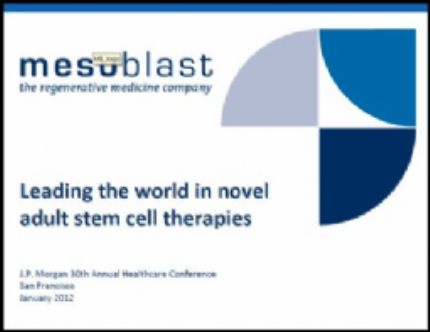Melbourne, Aug 12, 2008 AEST (ABN Newswire) - Australia's regenerative medicine company, Mesoblast Limited (ASX:MSB)(PINK:MBLTY), today announced successful preclinical trial results which showed that its proprietary adult stem cells regenerated and regrew damaged knee cartilage in post-menopausal osteoarthritis.
Key points:
- Preclinical trial results show that Mesoblast's stem cell product may be highly effective for treatment of post-menopausal knee osteoarthritis
- Single injection of Mesoblast's proprietary allogeneic, or "off-the-shelf", adult stem cells into post-menopausal osteoarthritic knees resulted in significant and sustained cartilage regeneration for at least six months relative to baseline
- Post-menopausal women represent largest target market for Mesoblast's knee osteoarthritis product
- Cartilage regenerative results mean that Mesoblast will expand commercial product focus to include both post-menopausal and post-traumatic knee osteoarthritis markets
- Sufficient funds in place for initial Phase 2 clinical trial
"These outstanding results indicate that Mesoblast's cells are able to support sustained regeneration of knee cartilage in post-menopausal osteoarthritis, an effect not seen with any competitor therapies currently on the market," said Professor Peter Ghosh, Mesoblast's Vice President for Cartilage Regenerative Programs and a world-renowned cartilage expert.
Around 40 per cent of ageing women suffer from post-menopausal knee osteoarthritis. This degenerative condition of cartilage loss is the leading cause of joint pain and disability among the elderly, and affects more than 10 million people in the US alone. Current therapies attempt to alleviate painful symptoms but are unable to preserve the cartilage lining the joint, with joint replacement often being the only option for restoring function.
Mesoblast Executive Director, Professor Silviu Itescu, said the exciting cartilage regenerative results meant that the Company would now target product commercialisation for both post-menopausal and post-traumatic knee osteoarthritis markets.
"We are sufficiently funded to commence Phase 2 trials of our therapy in patients with osteoarthritis of the knee, he said.
A single injection of Mesoblast's proprietary allogeneic, or "off-the-shelf", adult stem cells into arthritic knees of post-menopausal ewes with well established osteoarthritis, three months after initial joint damage, resulted in sustained, progressive regeneration and regrowth of knee cartilage for at least six months.
In 18 post-menopausal ewes, osteoarthritis developed following bilateral removal of the knee meniscus cartilage. Three months later, one group of six was examined to document the extent of osteoarthritis prior to treatment, and the other two groups received hyaluronic acid alone in one knee and hyaluronic acid plus Mesoblast's allogeneic cells in the other knee. One of these groups was then followed out for three months, and the other group for six months.
Prior to receiving any treatment, three months after removal of the knee meniscus the knee joints showed extensive osteoarthritis as evidenced by severe erosions and loss of cartilage. Six months after a single injection, osteoarthritic knees that received Mesoblast's allogeneic cells had as much as 20-25% thicker and greater area of cartilage lining the damaged joint than knees that received an injection of hyaluronic acid alone (both parameters p<0.05).
Even more important was the progressive, sustained and significant regeneration of cartilage measured at three and six months in cell-injected knees relative to baseline. Over the six months of follow-up, osteoarthritic knees that received Mesoblast's allogeneic cells demonstrated as much as 20-25% thicker and greater area of cartilage lining the damaged joint compared with baseline measurements of joints before treatment (both parameters p<0.001). This cartilage was rich in proteoglycan, the natural constituent of joint lining cartilage, indicating that the regenerative process had induced normal, functional knee cartilage. In contrast, no significant improvement over baseline was seen with a single injection of hyaluronic acid at either three or six months.
"As we progress in our clinical program, we will be actively seeking strategic partners with whom to commercialise our product for the broader osteoarthritic markets, including post-menopausal women," Professor Itescu added.
Contact
Julie Meldrum
Corporate Communications Director
Mesoblast Limited
T: + 61 (03) 9639 6036
M: +61 (0) 419 228 128
E: julie.meldrum@mesoblast.com
W: www.mesoblast.com
| ||
|







